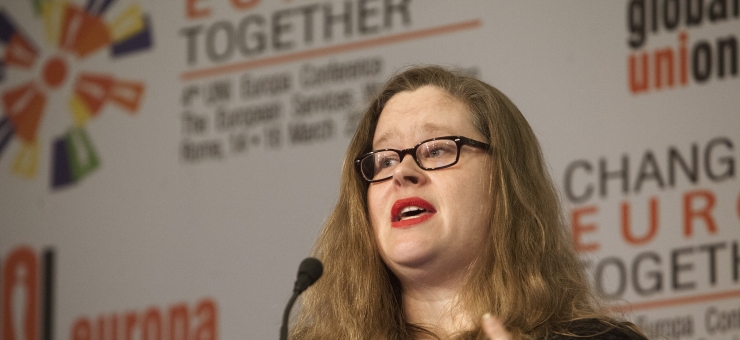“We need unions” – crowd worker’s plea to UNI Europa conference

“We need unions - your passion, experience and knowledge.” - This was the message from an Amazon crowd worker to trade unions at the UNI Europa Conference in Rome.
“You have been there and done it, we haven’t” said Kristy Milland, a worker of ten years’ experience on the Amazon platform Mechanical Turk. Milland is Community Manager of TurkerNation.com which began organizing workers once it recognised the need to protect those using the platform.
“People earn about a dollar or two an hour, globally,” Milland said. “But outside of India and the United States, workers get paid in Amazon gift cards.”
“The work is either approved and we get paid, or rejected and we don’t. Sometimes they just reject the work and steal it anyway.”
Crowd working is only one aspect thrown up by a new world of work in which it is proving increasingly difficult to organise workers.
Around one in eight workers in Europe are thought to earn part of their income from activities in crowd working, according to new data released by UNI Europa this week. Europe’s service sector unions are striving to adapt in order to reach out to a new generation of workers.
“The working world is fundamentally changing due to digitalisation,” said UNI Europa President Frank Bsirske. “We have platform-based business models that undermine and endanger existing companies and their workers, as well as the very idea of employment as it is now”
“Constantly subjected to competition and always willing to do the job for less pay - many don’t have any social protection or health insurance cover.”
Frank Bsirske spoke of the need for a revolution in the way in which unions organise in order to combat present challenges in reaching workers in the so-called gig economy where often there are no set workplaces and a level of anonymity not seen in other areas of work.
“The world’s largest taxi company, Uber, owns no taxis. The world’s largest hospitality company, AirBnB, owns no hotels. The world’s largest media company, Facebook, produces no content. It is completely different to previous industrial revolutions,” said one unionist from the United Kingdom, summarizing the scale of the problem organising such workers.

